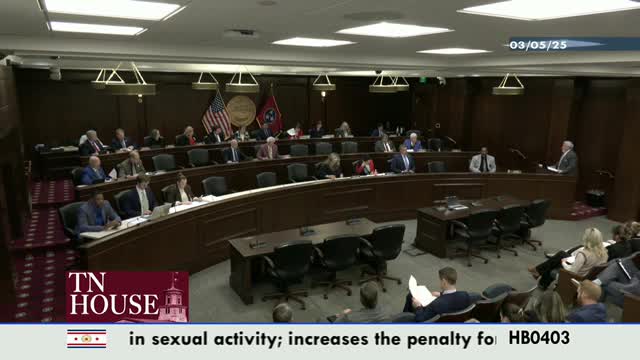Tennessee committee advances bill raising penalties for unlawful photography after victims testify
Get AI-powered insights, summaries, and transcripts
Subscribe
Summary
The House Judiciary Committee voted unanimously to send House Bill 403 as amended to the finance, ways and means committee after victims and lawmakers urged tougher penalties and clarified changes to the statute.
House Bill 403, a measure to broaden and stiffen penalties for unlawful photography, moved out of the House Judiciary Committee on a 20-0 roll call after victims gave emotional testimony and sponsors described the changes.
The measure would expand the statutory definition of unlawful photography, clarify “reasonable expectation of privacy,” update terminology, and raise the top penalty for some offenses from a class A misdemeanor (punishable currently by up to 11 months, 29 days and a $2,500 fine) to a class D felony carrying a prison term of “no less than two years and no more than 12 years,” according to Representative Crawford, the bill’s sponsor. Representative Crawford said the changes reflect “a stronger legislative intent to protect individuals from this invasive photography.”
The bill’s sponsor told the committee the amendment broadens the offense, “updates some of the terminology that we used 3 years ago,” and changes the penalty structure. He also explained the misdemeanor penalty in current law: "the misdemeanor was could be up to 11.29 in jail and a $2,500 fine," which the bill would replace for covered conduct with the stated prison range.
Victims who testified described long-term trauma from hidden photography and urged lawmakers to approve the tougher penalties. Julie Mix, who identified herself as a mother and high-school teacher, described discovery of secret recordings of her daughter and the litigation that followed: "She has been followed, stopped, been to numerous court dates, endured a 3 day trial, a sentencing hearing... he was found guilty and convicted and is currently appealing to the Court of Appeals." Mix argued the present misdemeanor penalty left judges limited in sentencing.
Another witness, Erica Thomas, said she supported the bill and asked for a favorable vote, noting the law left victims feeling that their attackers received only a “slap on the wrist.” Committee members across the aisle expressed sympathy and support; Representative Lambert said the losses victims suffer are long-lasting and urged passage.
Committee members posed questions about related sentencing consequences and whether the statute would affect registration as a sex offender. Legal services answered that the current statute leaves registration to judicial discretion and that the bill does not change that discretionary provision. The sponsor and counsel also noted that some portions of the offense remain at lower classes depending on facts.
Votes at committee: the Judiciary Committee adopted House Amendment 3,845 and then voted 20 ayes, 0 noes to forward House Bill 403 as amended to finance, ways and means.
The bill now awaits further consideration in finance, ways and means; the committee record shows broad bipartisan support in the Judiciary Committee vote.
Ending: The Judiciary Committee’s action does not itself change criminal law; it sends the proposal and the committee amendment onward for budgetary review and further floor or committee debate.
